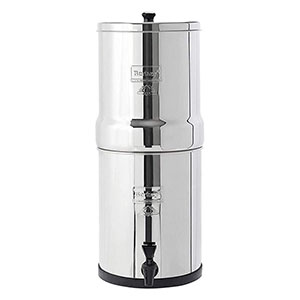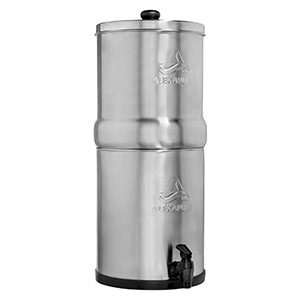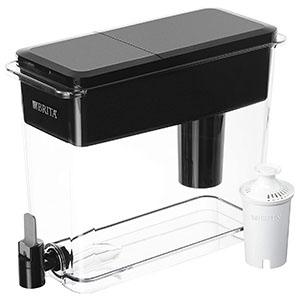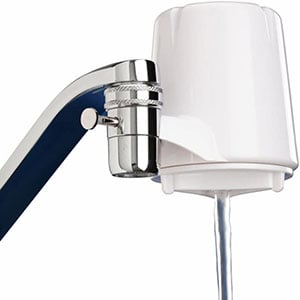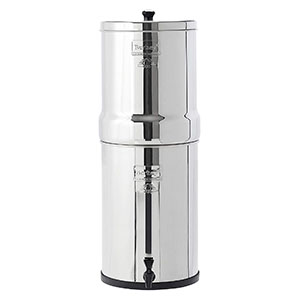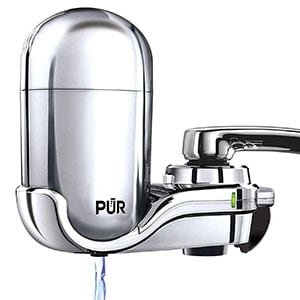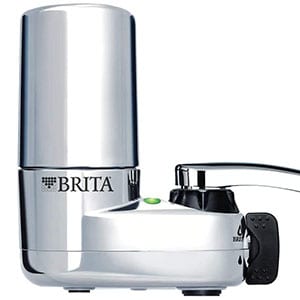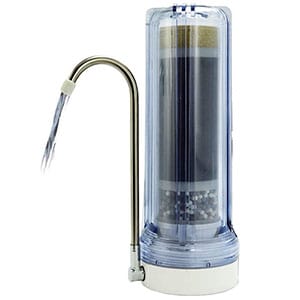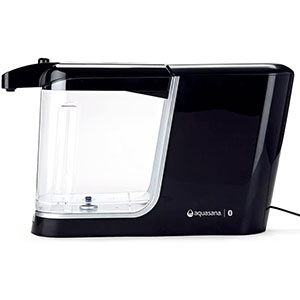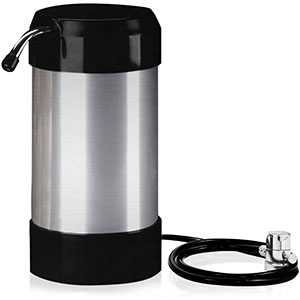A home water filter is a device that removes contaminants from tap water, making it safe for drinking and cooking.
Home water filters take many forms, but by far the most convenient and affordable are countertop models that strain water through a filter using gravity, and faucet-mounted filters that purify tap water before it reaches your glass, pitcher or pot.
In today’s world, fresh water resources are under increasing assault from industrial pollution, pesticides, fertilizers and just plain overuse. As such, a home water filter is no longer a luxury. It’s a common sense necessity. Below are the best home water filters of 2021.
1. Travel Berkey Gravity-Fed Water Filter
The Travel Berkey home water filter is a portable 1.5 gallon model that removes 99.99% of bacteria and viruses. It also removes heavy metals, inorganic minerals, and protozoa such as giardia that can cause chronic diarrhea. This is the smaller ‘travel’ version of Berkey’s gravity fed water filter system, and we give it extra points because it’s so easy to move from room to room.
The Berkey Travel Water Filter is just 18 inches tall and uses a pair of Black Berkey Purification Elements (included) that filter 6,000 gallons of water before needing replacement. It costs a bit more than some other countertop water filters, but its durability, portability and high degree of effectiveness make it money well spent.
2. Alexapure Pro Stainless Steel Water Filtration System
If you like what the Berkey has to offer but don’t want to spend quite so much, consider the Alexapure Pro Stainless Steel Water Filtration System. The Alexapure Pro is relentless in its pursuit of impurities in your tap water. It will remove more than 200 known contaminants, including up to 99.99% of E. coli, lead, aluminum, nitrates and more.
The unit could not be easier to use. Simply pour tap water into the upper chamber and let it drip through the filters into the bottom chamber. Filter 2.25 gallons at a time. Filters on the Alexapure Pro are good for 20,000 gallons before they need to be changed. That works out to just a couple of pennies per gallon.
3. Brita Ultra Max 18 Cup Filtering Dispenser
Brita has been making high-quality water filters since 1966. Their Ultra Max 18 Cup Filtering Dispenser is the epitome of affordable convenience. The Ultra Max does an outstanding job reducing chlorine levels in tap water along with heavy metals such as zinc, mercury, lead, copper and more. Simply pour tap water into the top of the unit and dispense it using the spigot.
You’ll get clean, great tasting water for drinking, making ice, making soups and stews, mixing with your protein powder and dozens of other uses. The Ultra Max Filtering Dispenser produces 1.13 gallons of water at a time and eliminates the need for hundreds of plastic water bottles over the course of a year.
4. Culligan FM-15A Faucet-Mount Advanced Water Filter
The Culligan FM-15A is a faucet-mounted water filter that completely eliminates storage capacity issues. It will purify as much water as you need, as often as you need it and deliver it right into your glass, pitcher, bowl or pot. The Culligan FM-15A drastically reduces heavy metals and chemicals in tap water, including lead, chlorine, the pesticide atrazine and many more.
The FM-15A adapts to all standard sink nozzles, has a sharp, contemporary design and generous flow rate of half a gallon per minute. The unit as a whole is guaranteed for 2 years, while the carbon filter lasts for 2 months on average and takes just a couple of minutes to replace.
5. Crown Berkey Gravity-Fed Water Filter
The Crown Berkey is the company’s flagship home water filtration system. It’s essentially a scaled-up version of our number 1 home water filter, the Travel Berkey. The Crown Berkey boasts a 6 gallon capacity, which makes it a great choice for large households, or people who entertain regularly.
At 30 inches tall and 11 inches around the Crown Berkey is not ‘compact’ by any stretch of the imagination. But it has a very agreeable look to it that will integrate nicely into just about any type of kitchen decor from farmhouse to minimalist. The filters are good for 6,000 gallons and remove 99.99% of bacteria, while dramatically reducing heavy metals and biological pathogens.
6. PUR FM-3700 Advanced Faucet Water Filter
Faucet mounted water filters don’t require giving up counter space and don’t limit how much water you can filter at any one time. The PUR FM-3700 has a beautiful high-polish, chrome finish that won’t rust and adds luster to your kitchen. The activated charcoal filter removes more than 70 types of chemicals, biological pathogens, and heavy metals. The unit can be installed in less than 5 minutes and does not require the use of any special tools. It is compatible with all standard fixed faucets (so no hand held faucets).
For about what you’d pay in one month for bottled water you can have the PUR FM-3700 Faucet-Mounted system. Besides saving money you’ll also be doing your part to help rid the oceans of plastic bottles.
7. Brita Chrome On-Tap Water Filtration System
Brita makes all kinds of water filters including faucet-mounted systems. Their Chrome On-Tap Water Filtration System is a convenient, affordable way to protect yourself and your loved ones from the threat of contaminated water. This handsome, chrome-plated, faucet-mounted filter weighs less than a pound. So it’s not going to damage your faucet. It removes 99% of lead and other heavy metals, and will provide 100 gallons of pure, tasty water before you need to replace the filter.
All in all the Brita On-Tap filter removes more than 60 contaminants from your tap water. You’ll sleep better knowing your family is getting the best quality water, and that your household no longer contributes plastic bottles to the Pacific Garbage Patch.
8. Apex MR-1050 Countertop Drinking Water Filter
The Apex MR-1050 Countertop Drinking Water Filter is a hybrid of sorts that provides the convenience of a faucet-mounted unit without taking over your sink. A discrete hose connects to the faucet and carries water to the countertop unit where it is filtered and dispensed. No more having to pour pitchers of water manually into the top of the unit. The MR-1050 removes heavy metals, chemicals, bacteria and more, including odors, while at the same time adding beneficial calcium, magnesium and potassium.
It’s a full-service water enhancement device that also helps you reduce the amount of plastic generated by your household. The MR-1050 fits most standard faucet designs and can typically be installed in just a couple of minutes.
9. Aquasana Clean Water Machine
The Aquasana Clean Water Machine produces pure, thirst-quenching water by removing nearly all contaminants, including heavy metals, pesticides, biological pathogens, environmental chemicals and more. The 4-stage state of the art filtration system employs activated carbon and catalytic carbon in the first 2 stages to get rid of organic materials and chemicals. The 3rd stage employs an ion exchange to remove heavy metals, including lead. While the final stage targets microorganisms such as giardia and cryptosporidium.
This is an active, powered, water filtration device that is NSF certified and BPA free. Filters are good for 320 gallons, which typically equates to about 3 months for the average household.
10. Cleanwater4Less Countertop Water Filtration System
Last but not least on our list of best home water filters is the Cleanwater4Less Countertop system. Like the Apex MR-1050 this is a hybrid of sorts that attaches to your faucet without taking over your sink. Instead a hose runs from the faucet to the countertop unit where the water is filtered and stored.
The Cleanwater4Less system purifies 10,000 gallons of water before you need to change filters. It removes nearly all chlorine and other chemicals, while also removing volatile organic compounds like acetone and benzene. The countertop unit looks a bit like a coffee dispenser, so it will fit right in with most kitchen decor. And it can be set up in about a minute by just about anyone.
FAQs
What Is a Home Water Filter?
A home water filter is a device that uses one of several possible methods to remove chemicals and other pollutants from water to make it safe for domestic use. Some water filters are installed near the source of a home’s water supply. These are called ‘whole house’ filters. Some are installed at the faucet, and others are countertop models into which water drawn from the tap is deposited. For the purposes of our list, we have included only water filters that do not require the services of a plumber to install. That means no whole house filters.
Countertop home water filters typically use a physical filtration system to remove impurities. This involves straining the water through a filter comprised of a textile membrane, activated charcoal or another material. Whether attached to the faucet or standing alone on the countertop, this type of home water filter is the most cost effective you’ll find.
Some filters operate on the theory of reverse osmosis (1). The same process that is often used in desalinization. Reverse osmosis, however, produces a lot of waste water. In some cases 3 or 4 quarts of water may be wasted for every quart of drinking water produced. For a desalinization plant that’s not a big deal. For a homeowner, it is. Reverse osmosis filters also require an electric pump. So, between the cost of running the pump and the amount of waste water produced, they are perhaps the least cost-effective type of home water filter.
Why do I Need a Home Water Filter?
You need a home water filter because the water coming out of the tap these days bears little resemblance to the water our ancestors used to drink. In fact, in some places it’s downright poisonous (2). In order to make water drinkable, most municipalities add chemicals, including chlorine. Sadly, many of those same municipalities fail to conduct proper testing (3) on their water and so numerous dangerous substances make it through to your tap. Those include:
Microorganisms – E. coli (4), cryptosporidium (5) and other bacteria and pathogens are routinely found in municipal drinking water. Even though government regulations state they shouldn’t be there. A good home water filter can remove these microorganisms before you drink them.
Chlorine – Chlorine is a staple of municipal water supplies the world over. It’s added in an attempt to kill some of the bacteria often found in city water. A little bit of chlorine is considered safe. Too much can leave your water with a potent, chemical taste and irritate the skin during baths or showers.
Arsenic – Unfortunately, arsenic in drinking water is not all that uncommon (6). While arsenic does occur naturally in some mineral deposits it is more likely that it winds up in drinking water because of industrial contamination. Moderate levels of arsenic can cause stomach problems, numbness and more. While large doses can cause death (7).
Nitrates – Nitrates (8) in water are typically the result of fertilizers and liquid waste seeping into the ground and finding their way into groundwater. Nitrates in drinking water are considered a major health threat for babies and pregnant women.
Aluminum – A tiny amount of aluminum in drinking water is not considered a health threat. And indeed, the government allows low levels of aluminum in both tap and bottled water. High levels of aluminum are another story altogether. Exposure to high levels of aluminum is believed to pose a threat to kidneys and the liver, and is linked to dementia (9).
Lead – There are several ways lead gets into drinking water. It can leach into the ground from factories. It may be the result of old lead pipes (lead used to be a common material to make water pipes from because it did not corrode). Or it may get into your drinking water because of lead used in solder and plumbing fixtures installed in your home before lead in plumbing was banned by the government in 1986 (10).
VOCs – VOCs, or volatile organic compounds, are found in up to 20% of US water supplies. VOCs include acetic acid, acetone, benzene, formaldehyde, trichlorethylene and more. Exactly how these compounds find their way into water supplies is sometimes a mystery. But it’s thought that most come from oil and gas spills, improperly disposed of industrial waste, septic systems, dry-cleaning waste and other sources.
What are the Benefits of a Home Water Filter?
A home water filter provides clean safe water all the time – The number one reason to get a home water filter is to ensure that you and your loved ones have access to clean, safe drinking water all the time. Along with food and air, water is one of those things we simply cannot do without. But if the water you drink is polluted, then it could wind up doing more harm than good. A water filter is more than a luxury. It’s an investment in your family’s wellbeing.
Home water filters save you money – People have been drinking bottled water for so long they don’t think about the cost anymore. But maybe they should. The average cost of a quart/liter of water is about a dollar. And since the average American now consumes more than 43 gallons of bottled water per year (11), that’s about $160 per year, per person. For a family of four that’s more than $600 per year. Most of the home water filters on our list cost just a fraction of that amount.
Home water filters improve the taste of your drinking water – These days no one can seem to agree on the water content of the human body (12)(13). In the end, the only thing that really matters is that drinking lots of water is essential for survival. Tap water in most cities and towns these days is a chemical stew. A water filter can remove those chemicals – and the bacteria they were intended to counteract – and leave you with the pure, tasty, thirst quenching water mother nature intended.
Home water filters help your food taste better – Would you feel good about serving your family a dish whose recipe called for bacteria, chlorine, aluminum, lead, arsenic (14) and other toxins? Of course not. But, unfortunately, when you cook with tap water that’s exactly what you’re doing. You may not notice the taste of these chemical contaminants, simply because you’ve been consuming them so long. But once you start cooking with genuinely clean, filtered water you’re going to notice a taste difference.
A home water filter can help save the oceans – While estimates vary, the Pacific Garbage Patch (15) may cover as much as a half million square miles and is comprised largely of non-biodegradable plastic. A lot of that non-biodegradable plastic used to be water bottles. If plastic waste continues to accumulate in the oceans we’re not going to leave much in the way of natural splendor to our kids and grandkids. A home water filter can remove your home from the list of those contributing to the death of the oceans.
Home water filters can lead to healthier skin – Tap water is often loaded with chemicals. Some are put there to purify it, others are there because they leached into the system through the ground undetected. When you wash your face with tap water, you are also washing it with those chemical pollutants. That can aggravate skin conditions such as psoriasis, eczema and atopic dermatitis (16). If you want your face to always look and feel its best, a home water filter can help.
Do I Have to Hire a Plumber to Install a Home Water Filter?
The only time you will need to ring up a plumber for help is if you are installing a ‘whole house’ water filtration system. That’s because they are spliced into the piping in the basement near the source of the home’s water. The units profiled on the above list do not require anything so drastic. With several, you simply pour water in through the top. With others, you attach them directly to the end of the faucet, a process that typically only takes a few minutes.
Will 6,000 Gallons of Filtered Water Per Year be Enough?
The vast majority of water used in the average household is used to flush the toilet, take baths and showers, water the lawn, and run dishwashers and washing machines. You will not be using the above home water filters for any of those purposes. Therefore, 6,000 gallons of water per year should be more than enough water for drinking and cooking.
How Often Should I Change the Filters in My Home Water Filter?
Every filter will come with its own instructions for when and how to change the filters. Changing them too often, though, is just a waste of money. Fortunately, there are some signs you can look for that will tell you that it’s time to make a change.
If you use your filter regularly you shouldn’t go longer than six months between changing filters. If you rarely use the filter then changing it once a year should be fine. You should also change the filter the minute the water starts tasting or smelling funny or off. Or if the water takes on an unnatural color. If the water is taking longer to work its way through the filter than it used to, that usually means the filter is clogged and it’s time to change it.
The Bottom Line
Home water filters are an important addition to any household. They protect you and your loved ones from oversights by the municipal water commission, contamination of well water by industrial pollutants, and bacteria that often finds its way into water supplies in the aftermath of natural disasters.
All of the home water filters profiled above are reliable products that produce clean, safe, tasty water for drinking or cooking. They will help ensure good health, save you money, and they are a step in the right direction when it comes to undoing the environmental damage caused by billions of discarded water bottles.
